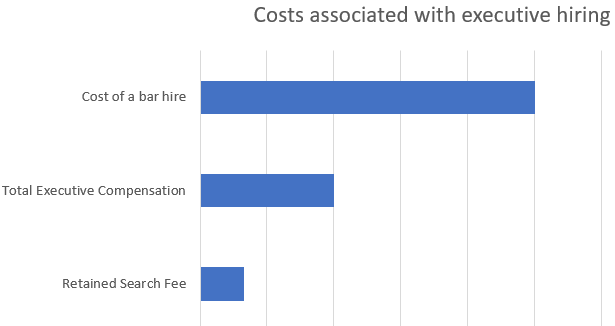Retained executive search firms can be expensive, often charging as much of 33% of total executive compensation. Given there are so many more cost-effective ways to hire, what is retained executive search and why would you use a retained executive search firm?
Cost isn’t everything, but let’s start by looking at this factor. Estimates suggest that the “cost of a bad hire” can equate to 2.5 times the salary of the individual concerned. Senior-level executives can earn a significant package, and so a bad hire at the c-level (or in other senior or strategic roles) can be expensive in terms of direct costs.
Executive hiring is difficult – Executive search can improve the odds of a successful hire
At senior levels, the real cost of a bad hire is the damage done. Strategic damage. Reputational damage. Cultural damage. CEOs and senior executives are paid to make big decisions. Just six months of poor leadership can have an impact on an organization that can be hard to quantify.
However, a bad hire given more time can cause real damage. Take George Shaheen who joined Webvan when it was one of the most exciting stars of the dot-com bubble. He spent $1.5 billion and, 18 months later, saw the business go into Chapter 11.
So bad hires can be expensive, and while no recruitment process can guarantee a successful hire, a retained executive search process is designed to increase the odds of success.

What are retained executive search firms?
A retained executive search firm is “retained” on an exclusive basis to go out and recruit the best candidate for a specific position on behalf of a specific client. This service is delivered through extensive research designed to identify all of the potential candidates for a role and to approach and appoint the best possible fit.
It should be noted that executive search firms operate for organizations large and small and that such recruiters don’t just work on behalf of major corporations. There is a significant number of non-profit executive search firms and academia search firms.
Also worth noting is that while global search firms like Boyden, Heidrick, TRANSEARCH, Spencer Stuart, Korn/Ferry and Egon Zehnder are high profile, there are a huge number of boutique firms that recruit top talent for particular industry or functional niches, or operate within a specific national or regional sphere.
Regardless of size, however, all of these firms have work thing in common – the work for the client company – not the candidate. Retained executive search firms are often confused with executive placement firms – these are very different. A retained recruiting firm will not charge a fee to the candidate – the cost of the service is always paid by the hiring firm.
What is the difference between retained and contingent executive search firms?
Executive search services are offered on a number of different payment models.
A contingent search firm operates on a “no placement, no fee” basis. A retained executive search firm is paid regardless of the success of the search.
Retained search is typically a lengthy process (a CEO search can take 90 days to complete) and so the guarantee of payment is necessary to allow the retained recruiter to undertake a thorough review of the market. Generally speaking, the more senior the role, the more likely it is to be handled on a retainer basis. It is worth noting, however, that a retained search firm will typically guarantee any placement, and will undertake the search again at no cost, if the selected candidate is not successful.
Some retained search firms will also offer a contingency recruiting service but this is unusual. Indeed, it is specifically outlawed by the Association of Executive Search Consultants (the AESC – the trade body for retained search firms).
Passive versus active candidates
The fundamental difference between retained executive search and contingent executive search is that the retainer model delivers a broader pool of candidates.
Most recruitment approaches focus on job-seekers – individuals who are actively looking for a change of role.
And there is nothing wrong with that.
However, by limiting a candidate pool to so-called “Active Candidates,” the recruiter is excluding an awful lot of potential candidates – and that might include ‘the best candidate’.
Identifying the problem
Of course, a larger candidate pool doesn’t equate to a better candidate pool. It’s about quality rather than quantity. That’s where the other side of executive search comes in – Executive search is consultative in nature (indeed, many search firms position themselves as ‘leadership consultants’ to reflect this).
A top executive search firm will work with the client to understand the fundamental requirements underpinning the need to hire.
The consulting process.
Not every Chief Executive is the same. Nor every CFO. Would you hire an executive from a fast-growing tech business to turnaround a manufacturing business? What about a leader proven from the banking sector for a role in the technology space?
Perhaps not…. However, you should at least be open to it. It might be that such an executive would have the vital transferable skills and a fresh perspective that might make all the difference. Jeff Bezos switched from Investment Banking to create Amazon and didn’t do too badly, after all. A creative executive search consultant will help the client look beyond the obvious and consider all of these options.
So, let’s discuss the research process
Once the requirements are defined, the search firm will identify a long-list of potential candidates who may be able to deliver the leadership required by the client. In some cases, more than 100 potential candidates will be identified – although in some cases, the list may be far shorter.
Retained executive search firms follow a research methodology designed to identify all the potential candidates for a role. This doesn’t just mean a quick search of Linkedin. Unquestionably, Linkedin Recruiter will play a part, but a broader combination of online research, telephone sourcing and old fashioned networking will all be utilized.
LinkedIn is available to anyone, but the public nature of the site means that senior executives are unlikely to be comfortable sharing the type of information that they might on a more private platform such as GatedTalent. An experienced recruiter may also have access to a significant internal database containing information which is not more widely available.

Approaching the executives
The challenge, however, has only just begun. If the retained executive search firm aims to identify both active and passive candidates, then it stands to reason that some of the candidates who are considered will not actively be looking for a new role.
The job of the recruiter is to change that. The skill here is to get past the gatekeepers and then pitch the opportunity on behalf of the client. Recruiters typically have extensive networks and will often turn to these connections as a way of approaching candidates and starting conversations. A personal introduction can often open doors that would otherwise be slammed shut.
Essentially, therefore, the service offered by the retained search firm is to help the client understand and scope out the role, to identify and then to approach the potential candidates. Once a shortlist is drawn up, the search firm will be on hand to help with the assessment process and will typically deliver detailed reports discussing the relative merits of the final candidates.
The drawbacks associated with using retained executive search firms
It should be said, however, that all forms of recruitment have drawbacks and retained executive search is no different. As alluded to earlier, a retainer is expensive – fee structures will vary from firm to firm, but 33% of total executive compensation is not unusual.
Larger search firms can also suffer from issues associated with “off-limits.” One of the benefits of using a retained executive search firm is that it will, over time, build a detailed understanding of the strategy, culture and leadership at any particular client.
Of course, organizations are generally nervous about sharing this type of information with recruiters! As a result, most recruiting firms that enjoy an ongoing relationship with a client will agree not to recruit talent from it – an “off limits agreement”. What this means is that many of the best-known search firms will be blocked from recruiting talent out of many of their major clients.
The other issue, of course, is that delivering all of the above takes time. A quick search on indeed will deliver a roster of potential candidates in minutes; a retained search firm will not manage that! A CEO search, for example, might take 90 days to complete. A board search might close more quickly, but – equally – there are many cases of executive searches that have dragged on. Recent examples include the searches for new CEOs for Intel and The Premier League.
When should an executive search firm be used?
The general perception is that search firms tend to be called in primarily for C-Suite and board appointments on behalf of major companies. There is no question that much search takes place in this environment – but c-level executive search for major organizations is not the only market where executive recruiters are retained. At GatedTalent our client roster ranges from global search firms who cover pretty much every sector, through to boutiques specializing in search within academia. From private equity specialists to nonprofit and mission-based organizations. From multinationals to privately owned or new startups.
In conclusion, the recruiting organization needs to weigh up a host of factors when deciding on a recruitment strategy, with the primary criteria including maximizing the chance of hiring the best candidate, the cost of hire and the time taken to complete the process. There is no one size fits all answer – but, generally, speaking, the more senior the position, the more impactful the role and the less the availability of talent, the more likely that a business will turn to a retained executive search firm.
About GatedTalent
GatedTalent is a service used by retained executive search firms to identify and engage with senior-level executives. Executive Search firms from more than 30 countries subscribe to the platform, while executives from more than 100 countries have created profiles, sharing achievement, aspirational and availability information with the recruiters. Search firms wishing to trial the service should apply here – executives wanting to get on the radar of our clients are invited to create a free profile.
About the author
Jason Starr is CEO of Dillistone Group plc, the publicly traded parent company of GatedTalent. Jason also serves on the board of Pcipal Plc, the fintech firm.
It might be that these executives have the vital transferrable skills and a fresh perspective that might make all the difference. Jeff Bezos switched from Investment Banking to form Amazon and didn't do too badly, after all. A creative search consultant will help the client look beyond the obvious and consider all of these options.













